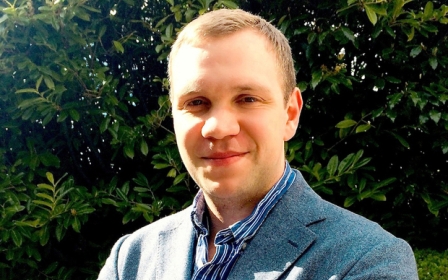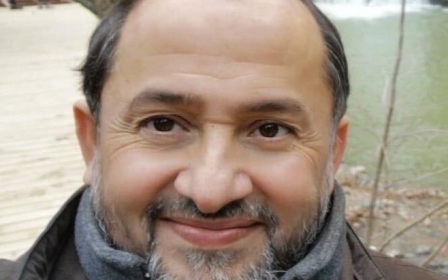UK Foreign Office failed to protect Matthew Hedges from UAE torture, watchdog finds

The Foreign, Commonwealth and Development Office (FCDO) failed to protect from torture Matthew Hedges, a British academic imprisoned in the United Arab Emirates in 2018, according to a parliamentary watchdog.
The Parliamentary Ombudsman recommended that the FCDO apologise to Hedges, compensate him with £1,500, and say within three months how it will "ensure its handling of similar circumstances is consistent with relevant guidance".
“At the end of the day, the role of the government is to protect its citizens and this was a profound failure," said the ombudman's chief executive Rebecca Hilsenrath.
"The impact will run deep for Mr Hedges and he will have to live with that for the rest of his life. This must not happen again to anyone else."
Hedges, then a Durham University doctoral candidate, was detained in the UAE in May 2018, accused of spying for the British government and held in solitary confinement for more than five months.
Stay informed with MEE's newsletters
Sign up to get the latest alerts, insights and analysis, starting with Turkey Unpacked
He says prison staff forcibly drugged him and interrogated him for up to 15 hours a day and, as a result, he signed false confessions. He was jailed for life in November 2018 but was released after a pardon five days later.
Hedges was first visited by British consular staff on 18 June 2018, over a month after his arrest, in a meeting which lasted five minutes.
A second visit, which lasted 30 minutes, took place on 30 August 2018. Hedges told the watchdog that UAE authorities told him what to say in that meeting and were present for it.
Missed signs
The ombudsman found that the FCDO, which said it lobbied for access to Hedges "over 50 times at the official level and 23 times at ministerial level", followed its consular access guidance consistently in his case.
But Foreign Office officials should have picked up on signs that Hedges had possibly been tortured and mistreated, and escalated his case to a human rights advisor for "advice, guidance and support...on international human rights standards" and "when and why it may be appropriate to intervene", the watchdog said.
The FCDO, the watchdog said, knew that Hedges was being held in solitary confinement "much of the time" and noted signs from their meetings that he was suffering from anxiety and panic attacks, both of which are signs of torture and mistreatment according to FCDO guidelines.
Additionally, between 2010 and 2019, the FCDO was aware of 75 cases of allegations of torture and mistreatment within the UAE justice system made by British nationals, the report noted.
FCDO officials told the ombudsman that it was FCDO policy that it could not raise complaints or allegations of torture or mistreatment without consent, and that the advisor to whom the case would have been escalated was a contractor without security clearance to advise on Hedge's case.
But the watchdog said the FCDO's guidelines allow for torture and mistreatment allegations to be pursued without consent and noted that FCDO officials were only able to see Hedges when those he said mistreated him were present.
It also said that the advisor's security clearance should not have prevented the FCDO from seeking further human rights advice.
"We find FCDO did not act in accordance with its own guidance in light of what it noted at the 18 June and 30 August visits; in light of what [Hedges] and his wife told it, and what it knew about the UAE context, and that was maladministration," the report said.
'A warning to all British nationals'
Hedges said that while he holds the UAE responsible for his torture and abuse, he found the FCDO's conduct "one of the most shocking things to deal with during that time".
"I felt completely abandoned by them and could not believe that they were not able to understand the very clear and obvious signs of my torture," he said.
'There are serious limits to what the FCDO will actually do to help and protect you'
- Matthew Hedges
Hedges said that when he was released, then Foreign Secretary Jeremy Hunt promised to carry out an internal review into the handling of his detention.
"This never happened," he said. "I, therefore, had no choice but to go to the Ombudsman with a complaint."
"This is a victory for me, but it is also a warning to all British nationals that the UAE commits torture and that there are serious limits to what the FCDO will actually do to help and protect you."
An FCDO spokesperson said: “The best interests of British nationals, including those detained overseas, is at the heart of our consular work and we support their families wherever we can. We will review the Ombudsman’s findings and respond in due course.”
The UAE government has said that Hedges was convicted in a fair trial and treated in accordance with international standards while in detention.
Hedges' allegations of torture against the UAE, as well as those of another British citizen, Ali Issa Ahmad, are currently being investigated by a judge of the Specialised Judicial Unit for Crimes against Humanity and War Crimes of the Paris Tribunal.
Roslyn Rennie, accountability campaign manager with UK-based Freedom from Torture, said the ombudsman had found that the UK government had "utter failed in its duty to protect British citizens from torture".
"Torture is an abhorrent crime that is used to silence and break people. Nobody should have to live in fear or be subjected to it," Rennie said. "The UK must defend and uphold the torture ban, and make sure that those who do commit torture are not allowed to get away with it.”
Middle East Eye delivers independent and unrivalled coverage and analysis of the Middle East, North Africa and beyond. To learn more about republishing this content and the associated fees, please fill out this form. More about MEE can be found here.




